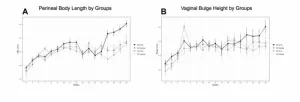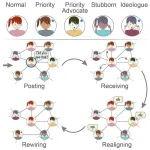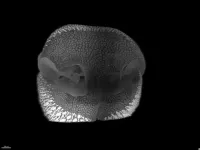(Press-News.org) TORONTO, Oct. 22, 2024 – Today, the Centre for Aging + Brain Health Innovation (CABHI), powered by Baycrest launched Ignite, its new funding program to support Canadian innovators designing solutions for older persons. As Canada’s aging population rapidly grows – with nearly 20 per cent of people above the age of 65 – so too will the need for innovations that enhance the lives of older persons, including those impacted by dementia.
Canadian early-stage innovators – including researchers, point-of-care staff, and companies – are developing innovative solutions that can improve the independence and quality of life of older persons and those impacted by dementia. Yet, these innovators face several barriers that prevent them from translating their promising ideas into real-world impact.
Ignite offers funding between $50,000 to $150,000 CAD, along with acceleration services, to early-stage innovators, empowering them to develop, test, and validate their solutions in real-world settings, with the ultimate goal of getting the best solutions to people who need them most. Funds can be applied to a variety of activities, such as:
Technological research and development activities
Concept and prototype development
Testing and simulating activities
Validation trials
“At CABHI, we are continually enhancing our programs to help innovators — researchers, clinicians, healthcare and seniors' organizations, entrepreneurs, and companies — catalyze solutions that improve the lives of older persons and their care partners,” says Dr. Allison Sekuler, President and Chief Scientist at CABHI and the Baycrest Academy for Research and Education. “Our new Ignite program fuels early-stage innovation, helping to overcome barriers and achieve rapid, real-world impact, especially for those at risk for or living with dementia.”
Ignite is seeking applications from early-stage Canadian researchers, clinicians, healthcare organizations, and companies with a solution that meets the eligibility requirements and addresses at least one of CABHI’s innovation themes:
Aging at Home
Caregiver Support
Care Coordination and Navigation
Cognitive and Mental Health
Financial Health and Wellness
“CABHI is doing exceptional work to help Ontario researchers and entrepreneurs develop and commercialize new products and services that can greatly improve the wellbeing of our loved ones who are living with dementia,” said the Honourable Nolan Quinn, Ontario’s Minister of Colleges and Universities. “That’s why our government has played an active role in supporting the work of CABHI and initiatives like its new Ignite program that provide much-needed support to early-stage innovators.”
Ignite applications opened online today, October 22, 2024, and will accept submissions until December 2, 2024. For more information, visit https://www.cabhi.com/ignite/.
Additional Quotes:
“CABHI’s commitment to mobilizing science-based innovations that improve the lives of older persons and those affected by dementia is truly inspiring.” says Valerie Bradford, Member of Parliament for Kitchener South – Hespeler. “The new Ignite program presents Canadian innovators with a valuable opportunity to make a significant difference from coast to coast to coast.”
About the Centre for Aging + Brain Health Innovation:
The Centre for Aging + Brain Health Innovation (CABHI), powered by Baycrest, was established in 2015 to support researchers, clinicians, and innovators, as they develop, validate, scale, and promote the adoption of innovations that improve the lives of older persons, including those impacted by dementia. CABHI is a unique collaboration of healthcare, science, industry, not-for-profit, and government partners. Through its funding programs and tailored acceleration services, including access to diverse end-user groups, CABHI advances transformative aging and brain health innovations across Canada and the world. For more information, visit: www.cabhi.com.
About Baycrest
At Baycrest, our vision is a world where every older person lives with purpose, fulfilment and dignity. Baycrest is a global leader in aging and brain health innovation, with over 105 years of expertise in seniors' care and cutting-edge research. Baycrest has been Designated with Exemplary Status by Accreditation Canada, and drives industry-leading care and safety outcomes. As the home of the Centre for Aging + Brain Health Innovation (CABHI) powered by Baycrest, the Baycrest Academy for Research and Education (BARE) and the Canadian Consortium on Neurodegeneration in Aging, Baycrest is at the forefront of dementia research. Affiliated with the University of Toronto, Baycrest's training programs shape the future of care globally, while Baycrest Global Solutions extends its expertise to senior living and healthcare internationally. For more information, visit: baycrest.org.
- 30 -
Media Contact: Rhea Singer, Senior Communications Specialist, rsinger@cabhi.com, 437-734-3708
END
A new artificial intelligence-based system can accurately assess the chromosomal status of in vitro-fertilized (IVF) embryos using only time-lapse video images of the embryos and maternal age, according to a study from investigators at Weill Cornell Medicine.
The new system, called "BELA,” and described in a paper published Sept. 5 in Nature Communications, is the team’s latest AI-based platform for assessing whether an embryo has a normal (euploid) or abnormal (aneuploid) number of chromosomes—a key determinant of IVF success. Unlike prior AI-based approaches, BELA does not need to consider embryologists' subjective assessments of embryos. ...
“This study represents one of the first to evaluate the impact of senolytic agents D+Q on the clinical development of pelvic organ prolapse and expression of proteins associated with cellular senescence in a mouse model.”
BUFFALO, NY- October 22, 2024 – A new research paper was published in Aging (listed by MEDLINE/PubMed as "Aging (Albany NY)" and "Aging-US" by Web of Science), Volume 16, Issue 19 on September 26, 2024, entitled, “Use of the senolytics dasatinib and quercetin for prevention of pelvic organ prolapse in a mouse animal model.”
Pelvic organ prolapse is a common condition among women ...
The UCLA Urology department has been awarded $6 million from the California Department of Health Care Services to continue providing vital care and critical services to underinsured and uninsured Californians diagnosed with prostate cancer.
For the next two years, the additional funding will support the 23-year-old IMPACT program—which stands for Improving Access, Counseling, and Treatment for Californians with Prostate Cancer—and extend the program’s reach and duration, ensuring continued support for California’s most vulnerable populations.
Led ...
ALBUQUERQUE, N.M. — Dangling from a weather balloon 80,000 feet above New Mexico, a pair of antennas sticks out from a Styrofoam cooler. From that height, the blackness of space presses against Earth’s blue skies. But the antennas are not captivated by the breathtaking view. Instead, they listen for signals that could make air travel safer.
Researchers from Sandia National Laboratories and Ohio State University are taking experimental navigation technology to the skies, pioneering a backup system to keep an airplane on course when it cannot rely on global positioning system satellites.
More than 15 miles below the floating cooler, cell phone ...
The interaction between humans and artificial intelligence is shaping a new thinking system, a new cognitive scheme, external to the human mind, but capable of enhancing its cognitive abilities. This is called System 0, which operates alongside the two models of human thought: System 1, characterized by intuitive, fast, and automatic thinking, and System 2, a more analytical and reflective type of thinking. However, System 0 introduces an additional level of complexity, radically altering the cognitive landscape in which ...
UPTON, N.Y. — Chemists at the U.S. Department of Energy’s (DOE) Brookhaven National Laboratory have developed a new theoretical framework for more accurately predicting the behavior of catalysts. These collections of atoms lower the energy needed for countless chemical reactions. The study reveals how conditions such as temperature and pressure can change a catalyst’s structure, efficiency, and even the products it makes. The findings are published in the journal Chem Catalysis.
“Our results highlight the significant impact ...
When X (formerly Twitter) changed its verification system in 2022, many foresaw its potential to impact the spread of political opinions on the platform. In a modeling study publishing October 22 in the Cell Press journal iScience, researchers show that having verified users whose posts are prioritized by the platform’s algorithms can result in increased polarization and trigger the formation of echo chambers. Because X’s new verification system allows almost anybody to become verified, this side effect could be taken advantage of by users wishing to manipulate others’ opinions, the researchers say.
“Our findings confirm ...
WASHINGTON, Oct. 22, 2024 – Disc golf is a sport growing in popularity, but there hasn’t been much research into the best techniques – until now.
Researcher Zachary Lindsey and his team studied professional and amateur disc golf players in Georgia to analyze the effect of thumb grip on disc-throwing.
“Participants were eager and excited to engage in the study, as there is clearly a thirst for scientific evidence and data to drive progress in the sport so that disc golf enthusiasts can improve their game in recreational and competitive contexts,” ...
About The Study: In this population-based cohort study including 392,000 mothers and 649,000 offspring, offspring from mothers with an eating disorder history or pre-pregnancy body mass index (BMI) outside normal weight were at higher risk of psychiatric disorders. The results differed somewhat between the 2 exposures with regard to which offspring diagnoses had associations, and effect sizes were typically larger for maternal eating disorders vs BMI. These findings suggest a need to consider these 2 exposures clinically to help prevent offspring mental illness.
Corresponding Author: To contact the corresponding author, Ida A. K. Nilsson, PhD, email ida.nilsson@ki.se.
To ...
The noses of many mammals, such as dogs, ferrets and cows, feature grooves forming a multitude of polygons. A team from the University of Geneva (UNIGE) has analyzed in detail how these patterns form in the embryo using 3D imaging techniques and computer simulations. The researchers discovered that differential growth of the skin tissue layers leads to the formation of domes, which are mechanically supported by the underlying blood vessels. This work describes for the first time this morphogenetic process, which could help explain the formation of other biological structures ...





